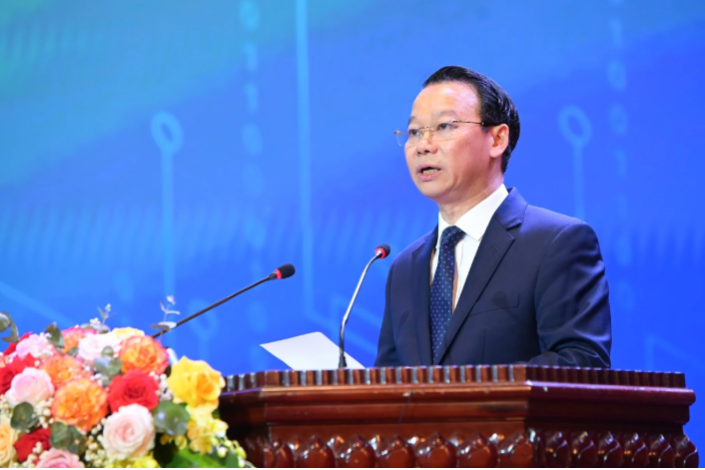Digital transformation is no longer just a trend but has become essential for developing agriculture and the environment.
This comment was made by the Minister of Agriculture and Environment Do Duc Duy at the Conference on implementing the plan to carry out Resolution No. 57-NQ/TW of the Politburo on developing science, technology, innovation, and national digital transformation. The event also emphasized related documents such as Resolution 193/2025/QH15 of the National Assembly and Resolution 71/NQ-CP of the Government.
Digital transformation is the foundation for industry development
At the Conference, Minister Do Duc Duy stressed that digital transformation is no longer optional but an inevitable path amid the agriculture and environment sector facing climate change, resource depletion, and the need for green growth. Although the sector has achieved some positive results, such as developing high-tech agriculture, applying sensors for environmental monitoring, and building land and meteorological databases, many “tasks remain” to meet the breakthrough targets required by Resolution 57.
 Minister of Agriculture and Environment Do Duc Duy at the Conference on implementing the plan to carry out Resolution No. 57-NQ/TW of the Politburo on developing science, technology, innovation, and national digital transformation.
Minister of Agriculture and Environment Do Duc Duy at the Conference on implementing the plan to carry out Resolution No. 57-NQ/TW of the Politburo on developing science, technology, innovation, and national digital transformation.The Minister proposed five key solution groups: completing institutional frameworks; reforming the research system toward streamlining and autonomy; innovating mechanisms for commissioning science tasks linked to practical application; developing high-quality human resources; and promoting comprehensive digital transformation.
The Ministry has also issued an implementation plan under Decision 503/QĐ-BNNMT, with 7 key task groups. The Minister called for synchronized engagement from localities, businesses, research institutes, associations, and international partners to create substantial and sustainable changes.
Bottlenecks that need to be addressed
According to the Ministry of Agriculture and Environment, science and technology currently face numerous obstacles related to institutional, financial, and operational mechanisms. One significant barrier is the slow pace of institutional reform, especially in mechanisms to attract and retain talent. There is still a lack of flexible legal frameworks to establish strong research groups—the foundation for breakthrough development.
Although the sector has over 11,400 scientists, 21 research organizations, and more than 16,000 hectares of research land, the effectiveness remains low. This is due to a shortage of policies encouraging innovation and improper resource allocation: local levels have budgets but lack human resources, while the central level has strong personnel but insufficient funding.
Notably, only about 46% of science funding is allocated to direct research; the majority is spent on maintaining administrative apparatus. Spread-out investment leads to many places having equipment but no operators and labs but no maintenance budgets. Key laboratories receive only about 3.5 billion VND annually, just enough for minimal operation.
Additionally, cumbersome administrative procedures pose a significant barrier. A scientific task often takes 5-6 years from proposal to approval, resulting in outdated outcomes, slowing technology transfer, and wasting resources.
Proposal to grant autonomy to specialized ministries
Another issue the Ministry highlights is passivity in accessing and implementing national science and technology programs. The Ministry of Science and Technology manages most programs, while specialized ministries, direct results users, lack autonomy over resources. This causes many high-application topics to be stalled or unimplemented.
Therefore, the Ministry of Agriculture and Environment proposes that the Government transfer certain national science and technology programs to specialized ministries to increase autonomy, flexibility, and efficiency.
The Ministry identifies three strategic pillars to create breakthroughs in science and technology activities: institutionalizing special mechanisms and removing legal barriers; leveraging internal potential and promoting genuine autonomy for research organizations; attracting social resources and strengthening links between the State, enterprises, and research institutions.
According to Minister Do Duc Duy, building excellent research groups with international influence is urgent, especially as the number of professors, associate professors, and leading scientists has stagnated or declined since 2024.
Ahead of Vietnam Science and Technology Day (May 18), the Minister also extended gratitude to the scientists and experts who have contributed to the sustainable development of agriculture, environment sectors, and the country.